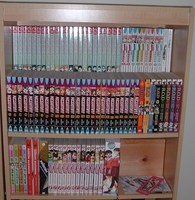Shelf Life
Love, Not War
by Bamboo Dong,

Eden of the East complete series
Hetalia: Axis Powers season 1
Rental Shelf
Linebarrels of Iron OVA collection
Perishable
You lucked out this week, anime
Welcome to Shelf Life.
 Ever since I saw the trailer for Hetalia at Anime Expo, I've been chomping at the bit to see it. A comedy about WWII? That's too weird and delightful to pass up. After slamming through the entire disc in one sitting, I was not disappointed. Look, all you naysayers, I realize Hetalia isn't 100% historically accurate, but if you were expecting Ken Burns: The Anime, then you need to unknot your panties. This series is less about history than it is about casting a humorous light on an otherwise bleak situation. It's stepping back, looking at a dark point in our collective history, and saying, “Yeah, we were all kind of assholes, weren't we?”
Ever since I saw the trailer for Hetalia at Anime Expo, I've been chomping at the bit to see it. A comedy about WWII? That's too weird and delightful to pass up. After slamming through the entire disc in one sitting, I was not disappointed. Look, all you naysayers, I realize Hetalia isn't 100% historically accurate, but if you were expecting Ken Burns: The Anime, then you need to unknot your panties. This series is less about history than it is about casting a humorous light on an otherwise bleak situation. It's stepping back, looking at a dark point in our collective history, and saying, “Yeah, we were all kind of assholes, weren't we?”Hetalia plays out more like a scene from a comedy where political giants are acting out abridged versions of history with paper dolls. It's bitter and irreverent, and from that stems the humor. Every single country/character is a total stereotype, and it's uproarious. From France being a pushover who's upset at being left out of big decisions, to America being an egotistical loudmouth who eats too much, to England being an uptight jerkoff, to Italy being a namby-pamby who only cares about pasta, these are the stereotypes everyone knows. Even the people on their high horse about how the show is so mean and racist know that deep down inside, they totally get it. Go to any international sporting event and you'll hear the same jokes being thrown around. These are the images that each nation projects, and if you're offended, you really need to get over it.
Adding on to this powderkeg of fun is the amazing job that the English dub cast did. The crappy accents are possibly the best part. I can't tell if the accents are bad because the actors couldn't keep them going for episodes on end, or if they're bad on purpose, but I'm really hoping for the latter, because it's genius. The accents that fade in and out of recognition add to the already hilarious self-mocking aspect of the show. They're not meant to be realistic accents. These are the fake accents that we asshole Americans use to make fun of other countries, like the flamboyant Austrian and the sing-songy Italian. I almost died laughing when Italy's monologue spun off into a list of pasta types.
To be honest, I only watched maybe five minutes of the show in Japanese before switching it over to English for the rest of the disc. I'm sure it's just as funny in Japanese, but as a native English speaker, I found the dub track much easier to relate to. They say it's always harder to understand humor in a different language. For a show like Hetalia, though, I think a lot of the vocal humor is region-specific. If international licensors aren't redubbing this for their own audiences, then I wish they would. I'm sure the Germans have a stereotype of American accents that only they would get, just as I'm sure the British and the Chinese do.
At Anime Expo, I saw a giant gathering of Hetalia cosplayers. Two of them were Hispanics dressed up as Mexico. They had zarapes and mustaches and derogatory signs. It was one of the funniest things I saw all convention. There's great value in being able to embrace your own stereotype and laugh at yourself. If you have any kind of sense of humor at all, you should check out this series. [TOP]
Of course, what goes up, must come down—including the quality of my anime consumption for the week.
 For every semi-serious anime series, there's a totally cheesy OVA accompaniment, whose only purpose is to answer the question of, “Say, I wonder what my favorite characters look like with less clothes on?” I appreciate the sentiment, because God knows I wonder the same thing about Don Draper, but in anime, it's usually pretty hit or miss.
For every semi-serious anime series, there's a totally cheesy OVA accompaniment, whose only purpose is to answer the question of, “Say, I wonder what my favorite characters look like with less clothes on?” I appreciate the sentiment, because God knows I wonder the same thing about Don Draper, but in anime, it's usually pretty hit or miss.It's hard for me to truly appreciate the Linebarrels of Iron OVA collection (two episodes total) because I never cared much for any of the characters. I think they're about as interesting as a bag of almonds. Unfortunately, since the entire reason for the OVA to exist is to satisfy fans of the series, I don't think I was able to be as engaged in the end product as its intended audience. Of all the Linebarrel characters, I also hate Rachel Calvin the most, so having an entire episode devoted to her really didn't do it for me.
Rachel is the quintessential American character in an anime. Everyone knows the type. They are usually blonde, they're really loud and brash, and they get in everyone's way. They are the Midwestern tourist that goes to Tokyo and yells really loudly about how they just want a burger. Rachel is pretty much that character, except she also whines… a lot. In both Japanese and English, she's cursed with the most annoying voice ever created by a human, and when you give that to someone who never stops talking, it is bad news. Needless to say, she made my life miserable the first episode, since the whole 23 minutes is her wandering around HQ and filming the various cast members. But hey, if you're hoping to see some breasts and butts, you will be pleased.
There is one really great scene, though, where she walks in on Koichi practicing some of his signature poses in front of a mirror. I always wondered if anime heroes had to practice their moves, so now I know the answer.
The second episode has just as much fanservice, since the characters have converted their base into a resort, but the last half has enough explosions to satisfy the action nerd in everyone. Basically, shadows of the Linebarrels are now attacking the base, and our heroes and heroines have to go back out in their mechs and defend the town once again. It's silly and frivolous, but it is a nice change of pace from seeing an endless parade of bikini-clad butts.
I wasn't particularly turned off by anything in this OVA collection, but I didn't really enjoy anything about it either. It's such a non-opinion that I almost feel bad for stating it, but there was truly nothing about this hour of my life that I found memorable. Since releases like this are tailored for hardcore fans, I can't really knock on the gratuitous fanservice. It wasn't scintillating enough to raise my blood pressure, but it wasn't overboard enough that I got bored of it. It just existed. These two episodes just existed. There's an hour-long void in my life that I can't really remember or justify. So hey, if you like these characters enough to really want to see them in swim suits and workout clothing, then by all means snap this thing up. Otherwise, just pass on it. If you have to ask yourself whether or not it's worth X dollars, then it isn't.[TOP]
Earlier today, I saw Ira Glass at The Grove in Anaheim, as part of a public radio tour he was doing. For two hours, he talked about what made good radio, and what made good storytelling. In order for a story to be interesting, it has to always have forward momentum. It doesn't matter if you're telling an epic, or a banal work anecdote. A good story must be paced so that one action follows the other, with another action right around the corner, so that the listener will always be curious about what happens next. It sounds obvious, but it's extremely hard to pull off. As I was watching Eden of the East, I kept thinking about what he said. Every time the episode ended, I wanted to know what happened next. Every time the main character got on his motorcycle, I wanted to know where he was going.
 Eden of the East has a good shot of being this year's best new show. It's the kind of show that makes you thankful that the entire series is crammed into one boxset. If I had to wait a week between every episode, I would've torn my hair out and paced back in forth in front of Production I.G, begging for a new installment. It's refreshing, it's riveting, and it unfolds so organically that you don't feel like you're being duped into watching a series with endless hooks.
Eden of the East has a good shot of being this year's best new show. It's the kind of show that makes you thankful that the entire series is crammed into one boxset. If I had to wait a week between every episode, I would've torn my hair out and paced back in forth in front of Production I.G, begging for a new installment. It's refreshing, it's riveting, and it unfolds so organically that you don't feel like you're being duped into watching a series with endless hooks.It sounds trivial, but one of the things that instantly sets Eden of the East apart from its contemporary anime brethren is its grasp on reality. Everything about it lets you believe that it's set in the real world, from the American accents on the Washington DC cops, to all the movie references dropped by the main character. At one point, when the two leads are going through New York City landmarks on a camera, they manage to invoke Meg Ryan and Ground Zero within a minute of each other. What's the last anime you saw that talks about real live-action Hollywood films? When's the last time an anime acknowledged 9/11 as a real event? These are small details, but they're ones that ground you to reality, and let you think, “Hey, these are real people, who live in the real world.”
The main character is a 21-year-old named Akira, who woke up naked outside the White House with his memory wiped. His only possessions were a cell phone and a gun. After a bit of investigating, he realizes that he is one of twelve Selecao, "saviors" who've been handpicked by some shadowy overseer to rescue Japan from socioeconomic and political despair. They're given 10 billion yen, and the help of a concierge who will fulfill any request they make. Though, considering that this series takes place only a year or so from now, $123 million is not that much. But maybe that's part of the challenge. There's a complex system of rules about the “game,” but all that's important is that basically, unless you're the first one to save the country, you die.
Written by Kenji Kamiyama, who's lent his ideas to Ghost in the Shell: Stand Alone Complex, Eden of the East really knows how to spin a good story. If this series had been written by a less talented person, it could've easily turned into an impotent cat-and-mouse chase about megalomaniacs running around trying to kill each other and take over the world. Instead, it's mindful about each Selecao's thought process, and really analyzes each person's ideas and how they use their money. One of the earliest ones introduced has spent his money building a private hospital, which provides not only hospice for the elderly, but also employment. In a much eerier scene, we see that before Akira lost his memories, his plan was to gather 20,000 NEETs (Not in Employment, Education, or Training) in one location and kill them (or so he thinks post-amnesia). Although there's a twist regarding this that's revealed later, it's a chilling, but thought-provoking comment speaks volumes without having to mention anything at all.
Without thumping the podium too hard here, I really think everyone should give Eden of the East a shot. It tells a really great story, and it's oozing with atmosphere. It's not every day that a series as fresh and complex as this is released, so you owe it to yourself to at least watch an episode or two. And it's streaming for free on Funimation's website, so you can't even use money as an excuse. Just check it out.[TOP]
Alright, that's my time. Erin will be back with you next week. Thanks for reading!

This week's shelves are from Brian, who had this poetically simple description about his anime collection:
"Its a rather small collection and it hasn't grown much since I bought my house....but I like it."


You know, that's as good of a reason as any. I like it.
Want to show off your stuff? Send your jpgs to shelflife at animenewsnetwork dot com. Thanks!
discuss this in the forum (46 posts) |